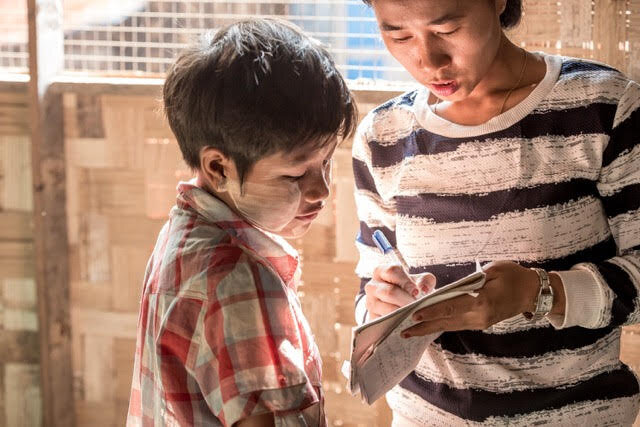CURRENT PROJECTS
Maternal & Child Health
The maternal mortality rate (MMR) of Eastern Myanmar is both unnecessary and devastating. In 2010, John Hopkins University reported the MMR in this region as 721 out of 100,000. No current data is available but little has changed over recent years and in many areas it is likely to be worse.
In partnership with Earth Mission Asia (EMA), we support a midwifery department that is part of EMA's Physician Associate Training Program. Together, we are dedicated to contributing to a significant reduction in the regions devastating rate of maternal mortality.
PA students gain practical and theoretical midwifery skills. We hope to build this program into a fully accredited midwifery program. The department also supports existing midwives from rural areas with medicines, equipment and referral services.
The department is run through Earth Mission Asia (EMA) who have a long history of healthcare training and service provision inside Karen State. Their clinical records show that maternal health care is one of the most needed medical services. There are 2 antenatal clinic’s, one at T-RAD and one in the jungle at RTC. The RTC facility has the capacity to do assisted birthing as well as c-sections and other high level interventions.
Ultrasound was first offered in 2017 and this was the first time that women in the area had access to that kind of technology. Now each month, up to 100 women receive ultrasound and antenatal care from the department. The assistance this department offers has improved many outcomes for women of the rural and remote areas.
The department is managed by a full-time Australian, registered midwife with over a decade’s experience in Eastern Myanmar. She works with a dedicated team of midwives, nurses and PA’s. Together, they provide training and clinical services.
Thanks to generous donors in 2022 we were able to raise $51,000AUD to fit out a Birth Unit with the equipment needed. This will be transported and installed in the Unit in early 2023.
Vocational Training & Early Education
The cost of living in Yangon, Myanmar has increased dramatically. Rental prices are at a record high. Thousands of poor and ethnic people are forced into slum communities on the outskirts of the city.
These people live a precarious life, under constant threat of eviction. Their dwellings are semi-permanent structures of wood, bamboo plastic and leaves. Long travel times mean access to schooling is near impossible. Parents are often forced to leave their children unattended in order to gain employment.
The vocational training and early education program is administered by a small, grassroots, local organization called Community Care Myanmar. They equip a small team of community workers to provide support in slum communities.
When not in COVID lockdown, they provide child daycare programs, basic preschool education and daily nutritious meals. Transport scholarships are also provided to a growing number of students.
Another current initiative is the Empowering Women project. This delivers a 3 month of training for young women in sewing, and aims to equip them with the skills they need to start a small business. We are privileged to partner with CCM, a registered, local non-governmental organization to run this program.
Physician Associate and Engineering Training
Decades of ethnic conflict in Eastern Myanmar have culminated in a serious healthcare crisis. To receive basic care, people will walk over an hour. Even then, a medic may only six months training.
To help address this problem, Earth Mission Asia (EMA) founded a Physician Associate Training Program. An Engineering Technician Training Program runs alongside the medical stream. The aim of the program is to establish and support not only a high-level health facility with out-patient and in-patient services, surgery, x-ray, and pathology, but also send out graduates to remote clinics.
Students are trained as Physician Associates in a five year program equipping them with the knowledge and skills to address the health problems of the areas they often return to serve. The training the students receive is ethnically appropriate, focused on relationship building and aims to dramatically reduce morbidity and mortality. Ten students are accepted to the program from rural and difficult-to-access areas, yearly.
The non-profit project is owned and run by dedicated members of the local community. It is supported by a Karen Board and an advisory committee of staff from Earth Mission Asia.





